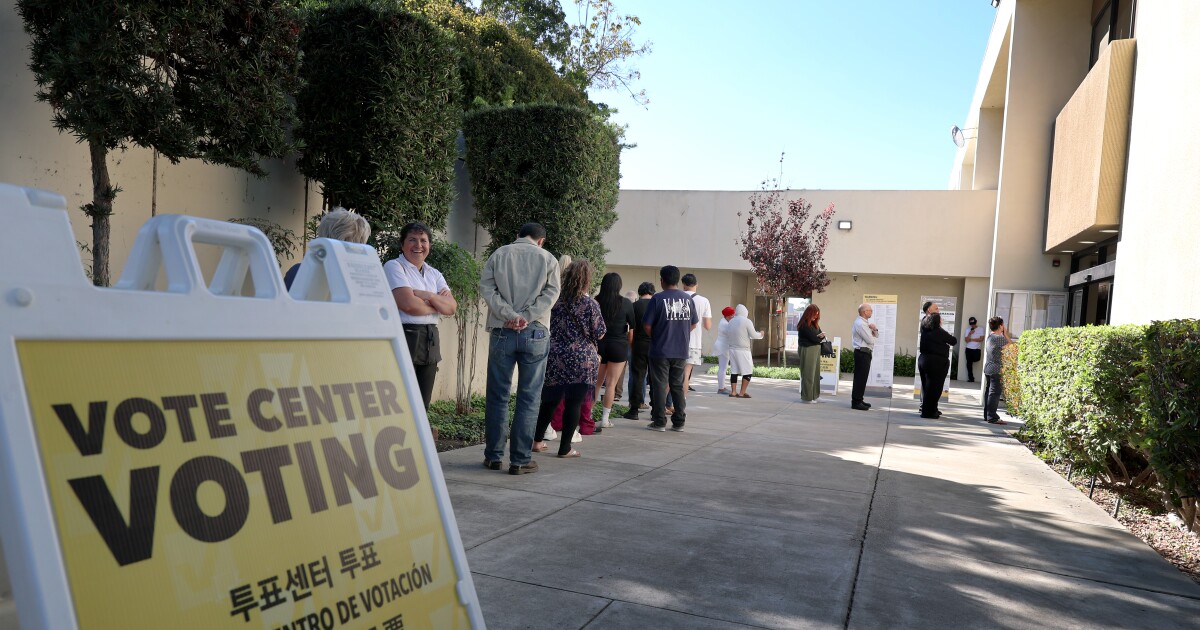Keep up with LAist.
If you’re enjoying this article, you’ll love our daily newsletter, The LA Report. Each weekday, catch up on the 5 most pressing stories to start your morning in 3 minutes or less.
California voters resoundingly approved Proposition 50, the ballot measure championed by Democrats to enact new congressional maps ahead of the 2026 midterms — a fight that became as much a referendum on President Donald Trump as a question of redistricting.
In passing Proposition 50, voters agreed to temporarily set aside the maps drawn just a few years ago by the state’s popular independent redistricting commission and approve congressional boundaries aimed at giving Democrats five more seats in the House of Representatives.
The measure, championed by Gov. Gavin Newsom, was a direct response to Trump’s demands that GOP-led states, including Texas, rework their congressional boundaries to benefit the president’s party ahead of the midterm elections.
Newsom and Democrats framed the fight as a way to safeguard democracy and check the president’s power, while Republican opponents focused their message on the popularity of the independent commission, the cost of an off-year special election and what they described as the unfairness of the new maps.
Gov. Gavin Newsom speaks as his wife Jennifer Siebel Newsom looks on during an election night gathering at the California Democratic Party headquarters in Sacramento.
(
Justin Sullivan/Getty Images
/
Getty Images North America
)
The race was called within moments of polls closing Tuesday evening. Speaking a short time later at the California Democratic Party headquarters in Sacramento, Newsom said he was proud of Californians for sending a “powerful message to an historic president.”
“It was not just a victory tonight for the Democratic Party, it was a victory for the United States of America, for the people of this country and the principles that our founding fathers lived and died for,” he said.
Newsom devoted much of his speech to attacking Trump and linking the president’s redistricting push to broader assaults on democratic norms, including aggressive immigration raids and deploying troops to Democratic-led cities such as Los Angeles. He noted that on Tuesday, as Californians headed to the polls, Trump issued a statement calling the vote a “giant scam” and threatening investigations.
“Instead of agonizing over the state of our nation, we organized in an unprecedented way,” Newsom said. “We stood tall and we stood firm in response to Donald Trump’s recklessness. And tonight, after poking the bear, this bear roared — with an unprecedented turnout, in a special election with an extraordinary result. None of us, however, are naive. This is a pattern. This is practice. Donald Trump’s efforts to rig the midterm election continue to this day.”
Republicans, however, were fuming. GOP Assemblymember David Tangipa, who represents a district stretching south from the Sierra foothills along the eastern edge of Central California, accused Newsom and Democrats of misleading voters with “emotionally charged arguments.”
“It’s a sad day,” he said. “The people of California have been lied to. They’ve been lied to by Gov. Newsom and the elites here in Sacramento to get people to vote against their best interests.”
In a state where Democrats hold a 20-point voter registration advantage over Republicans, defeating the measure was always an uphill battle for the GOP.
Mark Baldassare, director of the Public Policy Institute of California’s statewide poll, said that’s in part because voters viewed Proposition 50 through an unusually partisan lens for a ballot measure.
“The polarization is very much in line with what we have seen in candidate races,” he said.
Baldassare said that for 20 years, the PPIC poll has asked voters the same question when there’s a ballot measure: How important is the outcome to you?
“In the case of Proposition 50, 68% of likely voters said that the outcome of this election is very important to them,” he said. “I’ve never seen a number this high. And I think it’s this high because Proposition 50 is not just about what’s going on in the state. It’s about what is going on in the nation.”
Supporters of Proposition 50 said that was the message they carried to voters during the shortened campaign. SEIU California President David Huerta said union members knocked on nearly 160,000 doors and sent millions of texts and calls in recent weeks.
“This election proves what SEIU members know: People power will be the way to stop fascism and save democracy,” he said. “As Trump and MAGA Republicans aim to rig the midterm election to amass more power, escalate their attacks on our communities and march us down the path to unchecked authoritarianism, SEIU members’ thousands of volunteer hours helped Californians send a resounding message back to Washington, D.C.: Not on our watch.”
But Bakersfield Republican Rep. Vince Fong said the ballot measure will leave large parts of the state without representation.
“If Prop. 50 has shown us anything, it’s that Gavin Newsom is so desperate to be president that he’s willing to steamroll the state constitution and rural communities in pursuit of his personal ambition,” Fong said.
The passage of the measure now kicks off a scramble in the five newly drawn districts. Congressional hopefuls must declare their candidacy by early March to appear on the June primary ballot.
Erin Covey, who leads The Cook Political Report’s coverage of the U.S. House, said California could be hugely consequential next year as Democrats and Republicans fight for control of Congress.
That’s because, in addition to the five districts drawn to give Democrats an edge, the new maps made eight other congressional districts already held by Democrats even safer.
“So this could certainly determine who controls the house in 2027,” she said.

